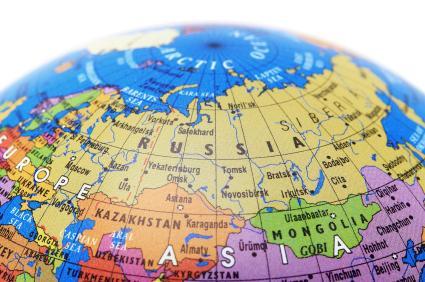
By the usual standards of Guardian reporting on Russia, this one by GQ Russia editor Andrew Ryvkin is… well, about par for the course.
Citing a recent PwC report that Russia will overtake Germany to become Europe’s biggest economy in 2030, he asks, “Should we believe them?“
Well, the PwC is just repeating predictions made almost a decade earlier by Goldman Sachs, which has thus far proved very accurate on the growing prominence of the BRICs in general, and of Russia in particular (regardless of repeated attempts to kick it out of that grouping, against the judgment of Jim O’Neill, the inventor of the BRICs concept himself).
So in effect Ryvkin is asking us whether we should trust a range of organizations with a great predictive record on the issue to the uninformed ravings of a Guardian hack.
Forget Russia’s very reasonable and respectable growth rates compared to the other Central-East European countries. According to Ryvkin, Russia’s downfall will be because it is “politics”, and not “strict economic policies”, that “rule these wintry lands.” What is the primary example he uses to demonstrate this?
One should also have sedatives close to hand while reviewing the figures. Russia has become one of the most corrupt countries in the world, and is barely making an effort to hide it. For instance, one of the Sochi 2014 Olympic projects – a 50 km road – costs nearly $8bn.
This meme was popularized by Julio Ioffe in the Western press on Russia back in 2010. It has also long since been long debunked, including on this very blog – although it continues to float around as a cliche among Russian liberal and journalist circles.
The only problem with looking at Russia through this failed state prism, without bothering to corroborate sources, is that in no sense can the Adler-Krasnaya Polyana route be described as just a “roadway”. Intended to be completed within 3 years in an area with a poorly developed infrastructure, this so-called “road” also includes a high-speed railway, more than 50 bridges, and 27km of tunnels over mountainous, ecologically-fragile terrain!
Then there’s this bizarre statement: “Germany, is currently associated with its policy of austerity, Russia is known for precisely the opposite.” That’s certainly news to me, as Russia has run balanced budgets for the past 2 years* – in stark contrast to, well, pretty much the rest of the developed world (including Germany for that matter).
And here you’re inevitably faced with a question: how would the Russian government act if it became a leading European economy and faced a crisis like the one in we have now in the eurozone, considering that this government has allowed the construction of a $160m/km road?
That is an extraordinarily remote possibility, seeing as Russia has fiscal unity and no significant sovereign debt (i.e. the lack of which define the European crisis). The very question is not only based on a faulty premise (the so-called “caviar road”) but essentially meaningless.
After some of the usual moralizing and content-free platitudes about the absence of Russian democracy, as well as the further extremely bizarre idea that the Chinese economy is not politicized like Russia’s**, Ryvkin wanders back on track with the usual spiel about how Russia is Nigeria with snow.
Here’s a question: who would want a Russian-made car, when even Russians don’t want them? Another one: who wants to fly Russian aeroplanes, when even in Russia people choose to fly on a Boeing or Airbus? But these huge industries still exist, resembling Frankenstein’s monsters of Soviet industrial might, brought to life by heavy injections of oil money and created by businesses that ultimately cannot produce a competitive product.
It goes against almost every aspect of economic, market-oriented logic, but it has nothing to do with the economy, because it aims to keep the workforce loyal to the government and project an image of a neo-Soviet industrial power. So is securing votes at the cost of your country’s economic development today a strategy worthy of someone who is going to lead the European economy in seventeen years? Is the strategy even smart?
Back in the world of hard facts and statistics, Russian car production was at 2.0 million units in 2011 (increasing by a further 15% in 2012) compared to 1.2 million units in 2000. Many foreign automakers have moved manufacturing into Russia, but that one presupposes is a good thing; that indigenous Russian brands haven’t done as well doesn’t mean much (which British brands are doing well apart from Rolls Royce?). There are few countries in which automobiles are a major export staple – incidentally, China with which Ryvkin incessantly compares Russia with isn’t one of them – and there is no good reason to expect Russia to become a major exporter of cars under any government, be it Putin’s or “even [a 10-year-old] (as long as he was smart enough not to stop the flow of oil and gas).”
That is because hydrocarbons are Russia’s comparative advantage, a concept which likewise explains why say Australia and Norway do not export much manufactured goods either. Ironically, the surest way to solve this “resource dependency” would be to get Ryvkin’s 10 year old President to ACTUALLY stop the flow of oil and gas.
That is also the reason why Ryvkin doesn’t work as an analyst at PwC but writes articles for the Guardian.
* Actually latest estimates show that 2012 had a deficit of 0.02% of GDP, but that’s of course basically a rounding error.
** Where to even begin here? For a start, consider the fact that the HQ’s of all the major Chinese companies have a “red machine” with a telephone link to Party functionaries.
